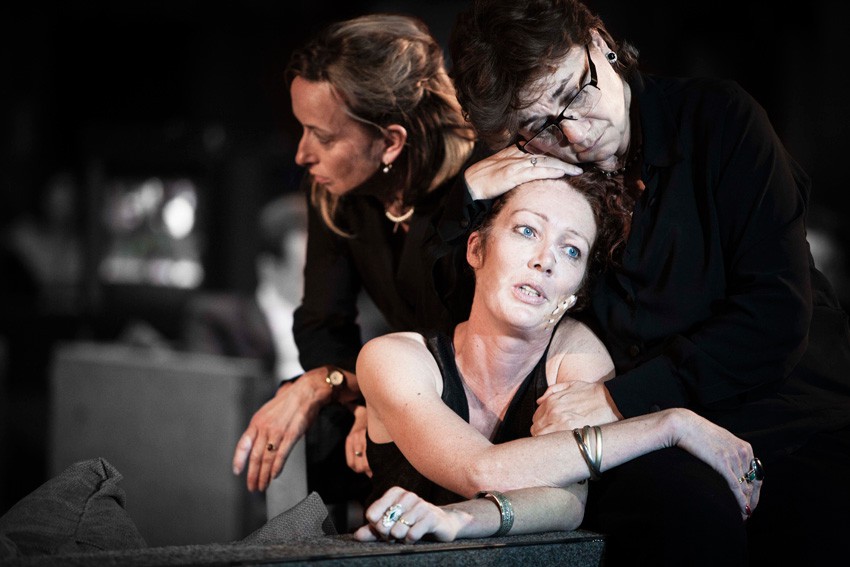Epic Tragedies

Roman Tragedies sounds nothing if not daunting: nearly six interval-free hours of Shakespeare… in Dutch.
This contemporary take on Coriolanus, Julius Caesar and Antony & Cleopatra, however, has been winning accolades around the world, and now makes its Australian debut. Presenting the work since 2007, director Ivo van Hove describes Roman Tragedies as “like wine: it gets better”. Given it takes 50 people to stage the work, van Hove’s Toneelgroep Amsterdam must be selective on where and when they can perform it. On invitation from the Adelaide Festival, van Hove immediately agreed because he knew the Festival could handle a big production such as Roman Tragedies. “I know that it is a really very important festival, so I am really proud that we were invited; that we can play (finally) this production for Australian audiences.” Throughout the show, the audience will be able, and encouraged, to take a seat on stage or come and go as they please. Audiences can Tweet, buy food and drink from the stage, and take photographs. It’s not just the audience capturing the work on their phone cameras though – film is integral to van Hove’s staging. “In this production everything that happens on stage is on film and video: and that is, of course, a very powerful instrument these days. It’s like Big Brother watching you all the time,” he explains. “And that’s also, of course, in the production: these politicians also use video – the fact that they are filmed – to communicate their message. It’s a good thing, and it can be a bad thing.” It would be easy to assume with the internet and video such a constant presence through the production that van Hove is making a commentary on our shared public spaces now existing in digital worlds. But, he says, “that’s the great thing: we are together here in the theatre. And we also use the internet and we communicate through Twitter […] but the Shakespeare tragedies go on. And that’s live in front of you.” In combining the plays together, van Hove had to make “brutal choices”, including cutting the crowd scenes from Shakespeare’s text. Here, it is the audience that steps into place. “We use the audience that comes to see the production as the people watching: witnessing what the politicians are doing,” he says. “So they are really like a community in the theatre together with the politicians.” As audiences enter they are welcomed with a running sheet breaking down the production. Says van Hove: “We are given the information when the show starts that within five hours and 28 minutes Cleopatra will die. It gives you a sense of importance, the historical importance: things have happened already historically, and you will witness it again now.” Through this, he strives to create the same sense of cliffhangers as in television. “You know you have to stay because lots of really important things are going to happen, even if after an hour lots of important things have happened already. It gives you the importance of the whole thing. A sense of urge.” And while the history of the texts and the time they talk about is integral to Roman Tragedies, for van Hove it is essential his productions “talk about today”. Looking a the stories from a contemporary perspective, of course, it was important for van Hove to make a big change from Shakespeare’s text: show more women. “That for me very important,” he says. “And I did it always when there was not a real relationship with a woman involved. Octavius is not married, he is still a young man in Shakespeare’s play, but here I made him into a woman because I think it would be a shame if I made a production about politicians today not to have woman involved.” Citing women from Margaret Thatcher to Angela Merkel to Hilary Clinton, “a lot more women are really in charge these days”. “I’m not interested in museum pieces, I’m not interested in a production the way that Shakespeare has done it in the 17th century: that makes no sense for me,” he says. “I want theatre for today, for the people of today, with the theatrical instruments available today. That means I can use microphones, I can use video, I can use Twitter, I can use social media: I can use what ever is available to me, when it makes sense. Not for the effect of it, but when it makes sense. “And I think that’s my only goal: to make theatre for the people today about the things that interest them today.” Adelaide Festival Roman Tragedies Festival Theatre Friday, February 28 to Sunday, March 2 adelaidefestival.com.au Images: Jan Versweyveld